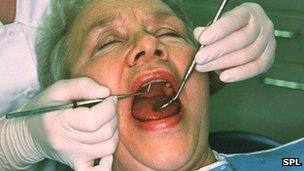Plea to dentists to check for mouth cancer
- Published

Dentists should check for mouth cancer as well as cavities
More dentists need to be checking their patients for mouth cancer, say experts.
Cancer Research UK says oral cancer rates are going up and some dentists are missing an opportunity to spot those at risk.
All dentists should be asking about risk factors like smoking or heavy drinking as well as early telltale signs in the mouth, says the charity.
By 2030 it is predicted there will be 9,200 cases of oral cancer in the UK every year compared with 6,240 in 2009.
Oral cancer affects the lips, tongue, cheek lining, gums, palate and floor of the mouth.
The British Dental Association said dentists examine these areas as part of a routine dental check-up.
Oral cancer rates are continuing to rise in both men and women and in all age groups including the under 50s with more young people developing oral cancer than ever before.
Major risk factors include smoking and alcohol and a virus called HPV (human papilloma virus) which can infect the mouth as a result of oral sex.
Hazel Nunn, Cancer Research UK's head of health evidence and information, said: "Too often oral cancer is found at a late stage when treatment is devastating and the chances of survival are poor.
"Dental teams are in a unique position to help detect oral cancer in its earlier stages when it's easier to treat and the outlook is greatly improved.
"If a dentist is looking at someone's teeth and knows this person smokes 50 cigarettes a day and drinks well above the recommended amount, he might look that extra bit more carefully."
Unusual changes
Early diagnosis and treatment can increase a patient's chances of survival from just below 50% to about 90%
Mouth cancer kills about 1,700 people in the UK every year.
The most common symptoms include painless ulcers that do not heal, red and white patches and unusual changes in the mouth.
Cancer Research UK, the British Society for Oral Medicine, and the British Association for the Study of Community Dentistry are asking the dental profession to make the detection and prevention of oral cancer a compulsory part of dentists' ongoing training.
In May, the British General Dental Council (GDC) made oral cancer detection a recommended, but not compulsory, subject.
A GDC spokeswoman said the council has no current powers to introduce mandatory topics until new rules and guidelines come into force following an ongoing review.